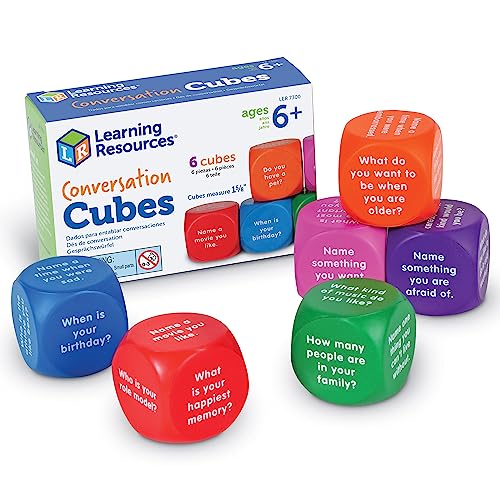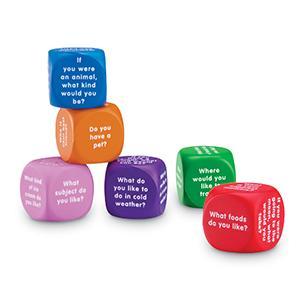Learning Resources Conversation Cubes

Learning Resources Conversation Cubes



| Dimensions: | 8.13 x 17.53 x 4.57 cm; 95 Grams |
| Model: | LER7300 |
| Material: | Plastic |
| Pack Quantity: | 6 |
| Batteries Required: | No |
| Batteries Included: | No |
| Age: | 6 – 10 years |
| Assembly: | No |
| Dimensions: | 8.13 x 17.53 x 4.57 cm; 95 Grams |
| Material: | Plastic |
| Quantity: | 6 |
Conversation cubes are a fun and engaging way to get children talking.
I bought these for my Hypnotherapy practice when i started to see young children.
They are a great way to get them to ask me questions before i try to start asking mine in return. As they are made of heavy sponge they are also great for throwing across the room to each other as a fun way to swap them or roll to select random questions.
Highly recommended for therapists who have young clients with a variety of needs, including autism, speech disorders, and social anxiety. They are also great for use by parents and caregivers to help children develop their language and social skills.
Or simply juggling with.
I had a new 8 year old client diagnosed with autism and who wasn’t keen to talk about their feelings. These dice were the perfect way to build a rapour and help the child open up. They were fun yet delivered some helpful insights. Highly recommended.
I work with children and young people who have complexities. I use these to break the ice and get to know them without overbearing them with conversation. The questions are generic questions and not too deep so the young people are happy to answer them and ask me them too!
I highly recommend these. I do therapy work with children of all ages and these are a great way to build their self-esteem and get the conversation started. The dice are a ‘stress ball’ material so its a bonus that they’re sensory and also that they don’t make an annoying sound when rolled across the table
Highly recommend
As a young peoples pastoral worker its been such a challenge to engage with young people via zoom or Teams. These conversation cubes have become a regular part of my sessions. Great value for money . Very helpful.
Bought these for work with families, have also used them with adults with intellectual disability. They are such a super, simple idea that really works, especially building relationships with new clients.
Great to help autistic kids to learn about social interaction using them with both ours sons so they can ring older relatives during covid 19 lock down and have something different to do with them
Brought this to help my son expand his vocab, imagination, presentation, comprehension etc as part of an effort to help with his English comp. Fun way to ask a few questions to help probe and understand a story/text far in far more depth
I use this as first day of school icebreaker as I teach international students who are sometimes shy on day 1. It’s a great way to get them to start asking their own questions as well.
Did exactly what I needed them to do, which was to get a bunch of teenagers who didn’t know each other talking and finding out about each other. However I do think they are a little expensive for what they are.
This is a great learning resoure. It’s only downfall is that questions on the cubes rubbed off after a couple of weeks. I used a permanent marker to write new questions on and have ordered a new set because despite that, the children love them!
Very useful, had to purchase two sets as my colleagues also love them! Use them as icebreakers when meeting new families; I would say useful from the ages of 4-12.
We use these blocks now and then with our eight year old grandson who has ADD. Using them encourages him to think carefully and come up with answers that often surprise us and help us chat with him.